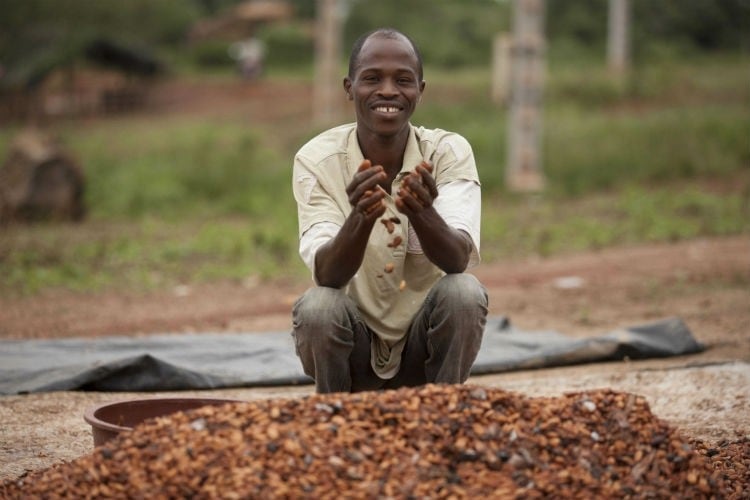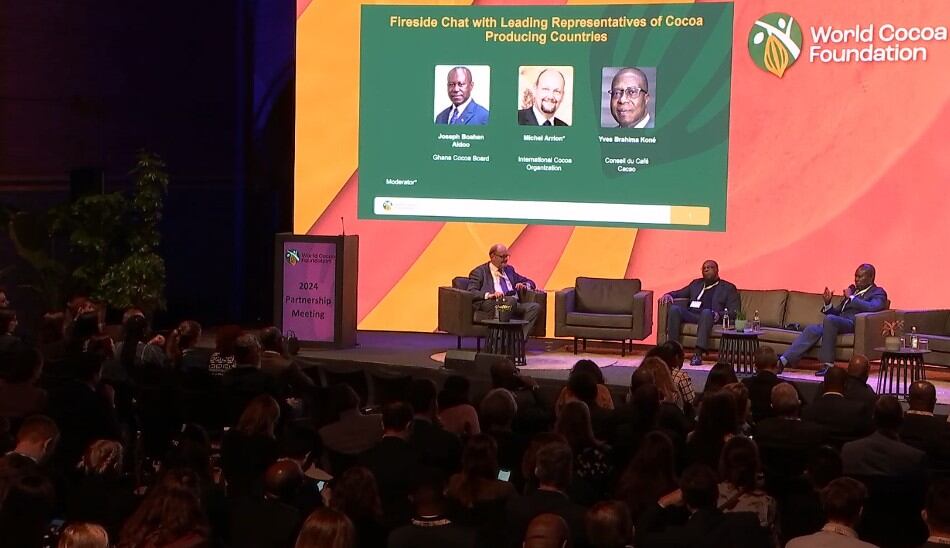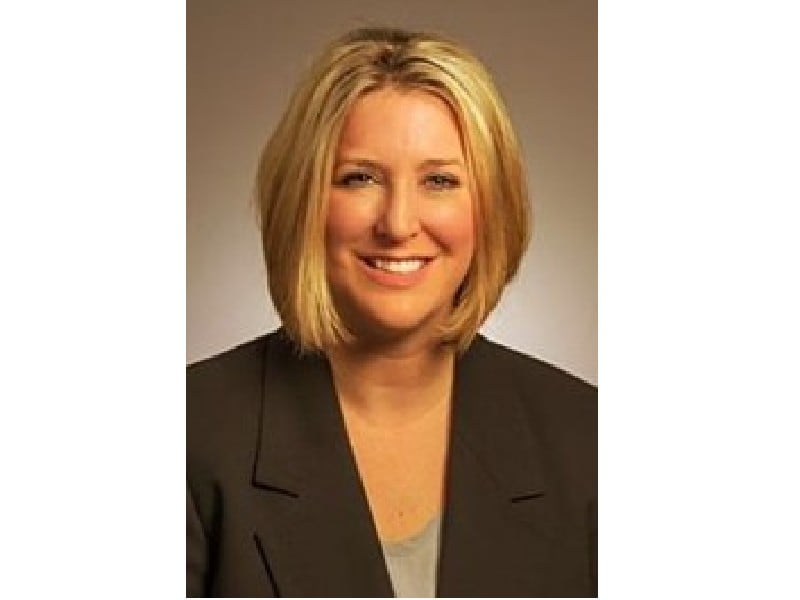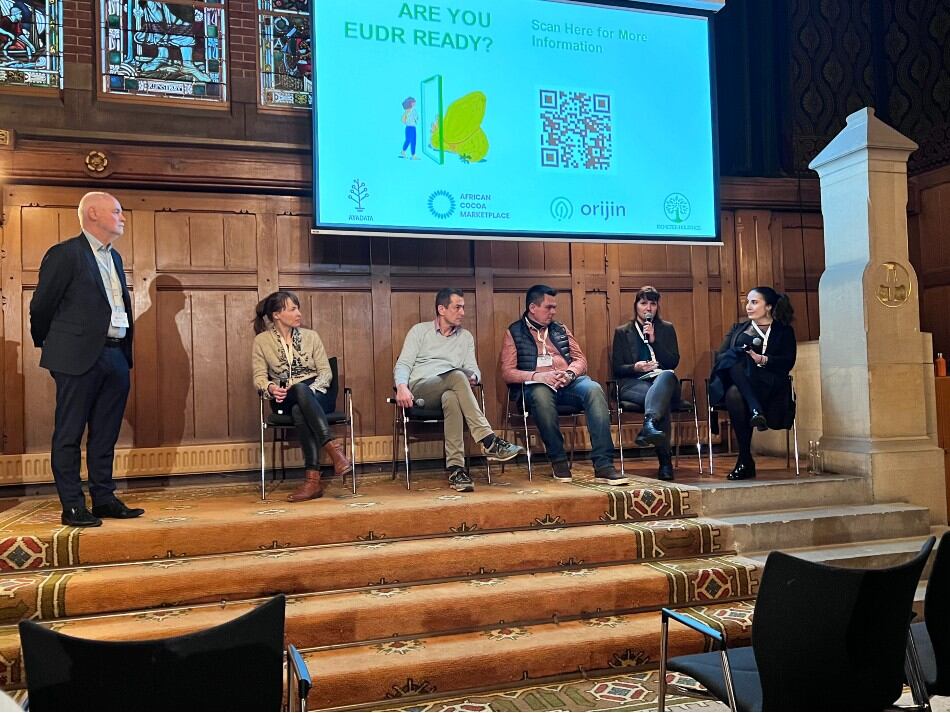Moderated by Nicko Debenham, founder of Sustainability Solutions Ltd, and Anna Laven, creative director of The Company Behind Chocoa, the pair wasted no time calling for a new policy adoption from the chocolate industry to include ‘responsible procurement’ in the future.
Debenham said the focus on living income for farmers in the past 10 years had been a wake-up call to the industry and questioned why traceable supply chains are not the norm - and why it has taken EU legislation to focus the industry on sustainability issues such as farmgate price, deforestation, and child labour.
Who is missing in this room? Where is the retailer and the consumer? -- Anna Laven, creative director of The Company Behind Chocoa
“I have been involved with companies that were polygon mapping farms in 2007, so the argument that it was because the technology has not been there is simply wrong; it can be – and it has been done,” he said.
Laven went on to question: “Who is missing in this room? Where is the retailer and the consumer?” She asked what role brands play, “Shouldn’t we be all in it together?”
She said the retailer makes decisions for the consumer; they decide what they feed to the consumer. They determine what the prices are. “Why are they not here? Is it also their responsibility when talking about procurement?”
The Hershey Company
In a previous session convened by the World Cocoa Foundation, Tricia Brannigan, chief procurement officer and VP of Global Procurement at The Hershey Company, told this publication: “The farmer is central to Hershey’s entire cocoa strategy. Without the farmer, the family, and the community operating in a way that’s profitable and allows them to have a prosperous future, we won't have cocoa. So it is core to our strategy, and it’s core to how we think about the work that we're doing across our sustainability procurement team.”
Debenham said farmers need a living income, but the challenge for the industry is how to get there.
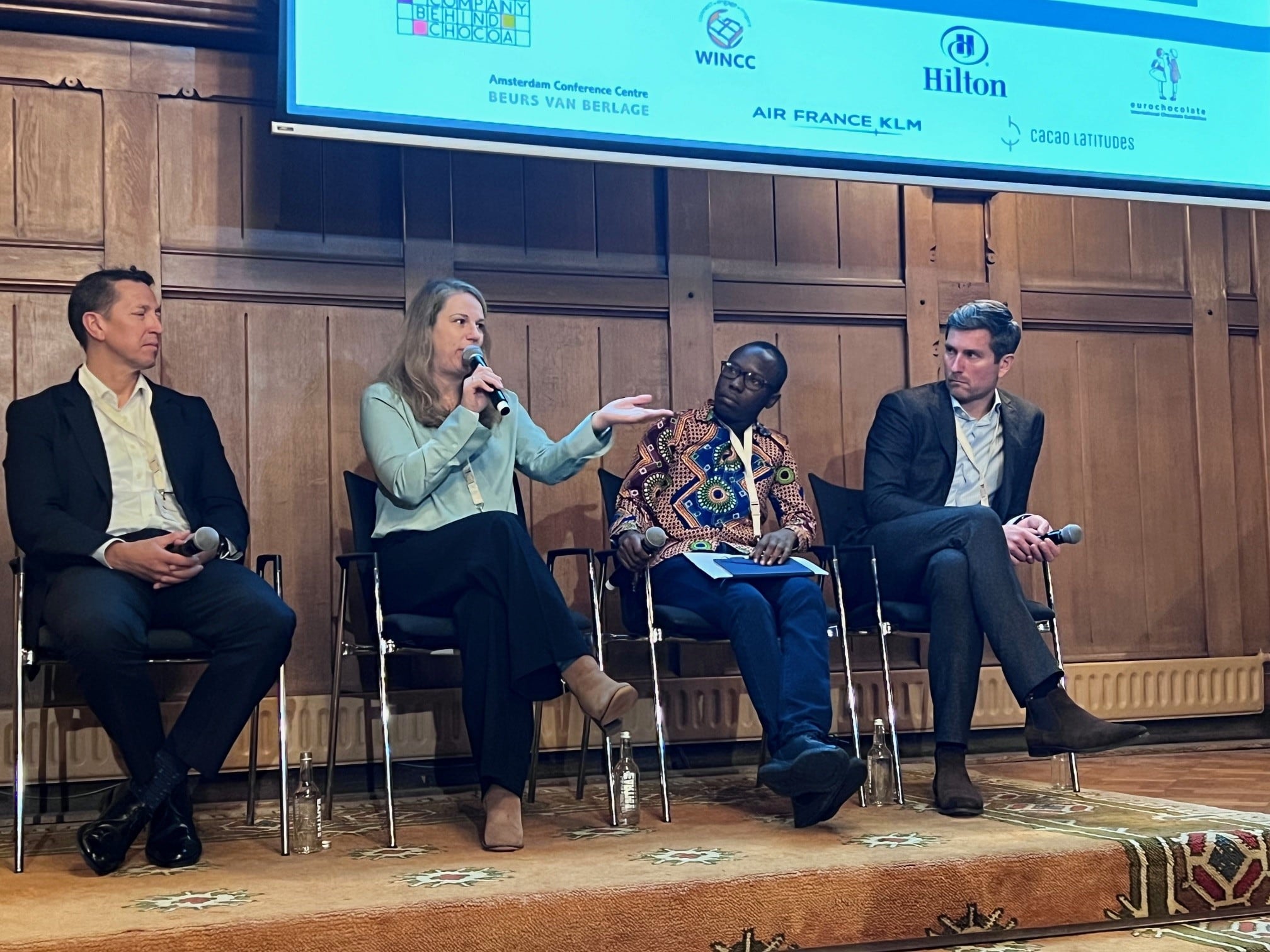
African Cocoa Marketplace
The African Cocoa Marketplace is a new platform that is ‘fantastic for linking markets, farmers, and organisations – and puts the farmers first,’ the conference heard.
“If we can improve cocoa farmers' lives, if we can make the cocoa world a better place for everybody, then we are happy, said Benjamin Setor Gbadago, relationships director at African Cocoa Marketplace and one of the panellists.
“There are so many challenges in cocoa, and there's so many conversations going on around cocoa. But as far as procurement is concerned, we believe it is not just about the cocoa beans - or the value-added products it can give us. It is also about sharing culture and understanding where the cocoa comes from. Procurement is not just about facilitating the movement of beans from one end of the supply chain to the other, but also the movement of a specific part of the culture of people to another area … and where the culture is perceived in particular a certain way.
We are in a unique position to redirect power when it comes to trading and set new rules for the game -- Emily Stone, founder and CEO of Uncommon Cacao
“We have talked about the de-commodification of cocoa, and it is very crucial because not only is the chocolate maker protecting the flavour of the beans at all costs, but they are also supposed to be protecting the story of the beans … because when somebody goes to the shelf and decides to pick one chocolate bar over the other, they are making a decision based on the perception they have on the culture that produces the beans. This is very crucial that when we are discussing procurement … that we look at the procurer as somebody who is also facilitating conversation between two cultures.”
Uncommon Cacao
Panellist Emily Stone, founder and CEO of Uncommon Cacao, said her company is already procuring beans responsibly and publishes all the prices it pays to cocoa farmers across its supply chain. “We are the only one with this kind of full transparency.” She called for the industry to decommoditise cocoa and adopt a more transparent trading model.
“We are in a unique position to redirect power when it comes to trading and set new rules for the game, with new values.” She called for a “farmgate forward” approach to pricing rather than market-led, giving farmers more say in their beans' value, ultimately providing them a living income.
ICE
Toby Brandon, senior director at Soft Commodities ICE, which trades in cocoa futures. He said his company sits in the middle of the cocoa market infrastructure. “Cocoa markets have been around futures markets for 100 years in London and New York – and they were first formed to manage supply chain risk and price risk in the supply chain.
While originally the markets were formed to manage that supply chain risk of price, he said these days, the new risk is in the challenge of regulation and sustainability.
The EUDR is centred around knowing where your supplies come from and proving that they were produced and handled correctly, which we will fully support -- Toby Brandon, senior director at Soft Commodities ICE
He introduced a new platform, ICE Commodity Traceability (ICE CoT), that the organization has been developing to help cocoa traders specifically comply with the new European Union Deforestation Regulation (EUDR).
“We've been connecting buyers and sellers through price for 100 years,” he said. “Now we can connect them through their due diligence validation and whatever they need to demonstrate compliance to this regulation and any future regulations. The EUDR is centred around knowing where your supplies come from and proving that they were produced and handled correctly, which we will fully support.”
Brandon said ICE has spent several years assessing the regulations and has been engaging with associations, authorities, and regulators to provide a piece of market infrastructure that can help connect the origin sales of independent exporters or bodies to the European market.
“The simple concept is that the data is collected on the ground not by ICE CoT but by the independent operators on the ground.”
Cargill
Cargill is a big player in the cocoa sector; therefore, it was argued it has a big responsibility toward responsible procurement. Panellist Marijn Moesbergen, Cargill’s Cocoa Sourcing lead, said his company sources and grinds more than 800,000 tons of cocoa annually with more than 400,000 farmers in its direct supply chain.
He said six million farmers earn their living from growing and selling their beans to the industry, and 90% are smallholders. So far, Cargill has mapped over 400,000 farms in its supply chain. Its good purchasing practices include forging solid supplier partnerships, strengthening and investing in supplier power, and offering sustainable pricing to farms with fast and regular payments and complete transparency.
The cocoa farmer’s perspective
African Cocoa Marketplace’s Setor Gbadago said what makes his trading platform different is it is attempting to understand as much as possible what the supply chain looks like from a farmer’s perspective and the buyer’s.
They don't just want people who are interested in buying cocoa beans … they are interested in people who are working with them from seedlings to dry beans -- Benjamin Setor Gbadago, relationships director, African Cocoa Marketplace
He said he has visited farmers in cocoa-growing areas to gauge their priorities. While obviously, the farmgate price is a significant concern, he said they are also interested in having some evidence of due diligence; they want to make money and have a social impact.
“They don't just want people who are interested in buying cocoa beans … they are interested in people who are working with them from seedlings to dry beans,” he said. “What they are looking for in this case is somebody who can have a clear transparency where both are involved in the production and that the value that each of them brings to the table can be seen across the board.”
Regarding sustainability and social development, Setor Gbadago said farmers are saying some companies give them money to carry out developmental projects - and all they do is sit and wait for the return of their reports, but how are these reports verified? They asked.
He said the farmers in Ghana are looking for people to partner with them and directly work with them – to get involved in the field to do the work involved. “That is going to get the impact that they want to and will create transparency in a partnership,” he said.
At the end of the session, Brandon said it comes down to “trust and tradeability”. He said ICE CoT, from the perspective of this forum, is all about maintaining access to the European market, which is good for independent exporters … it's suitable for firms. It also works for direct sourcing, “if you need one platform to standardize with checks and balances, but it's all about maintaining that traceability.”
Crucially, ICE doesn’t dictate the price of cocoa beans; it buys and sells at current market prices, and buying futures stops the market from collapsing if there is a shortage, like the one the industry is experiencing now, he said.
Voice Network
Antonie Fountain from the Voice Network asked the question before the session ended: “Well, what is a fair price for a farmer?”
He reminded the conference that farmers currently take all the risk because of the general purchasing practices of the industry- and there is no guarantee at the end of the month that they will be paid for their beans.
He called again for the cocoa sector to adopt and stick to a Living Income Reference Price; it deserves to be a centered position in any conversations around the changes needed in the cocoa sector – and, for that matter, responsible procurement.

